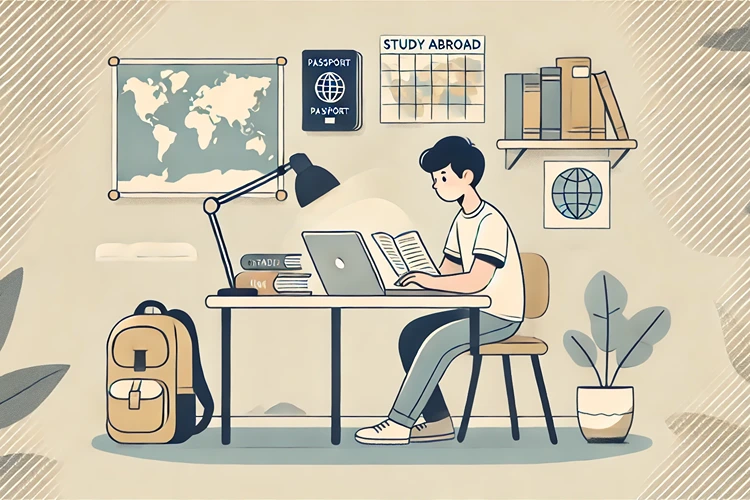Studying abroad is a life-changing experience that offers countless opportunities for personal and academic growth. However, it’s not as simple as packing your bags and hopping on a plane. There are crucial factors every student should be aware of before embarking on this journey. This article will cover the most important study abroad essentials every student should know, ensuring you’re fully prepared to make the most of your time overseas.
What Are Study Abroad Essentials?
Before diving into the details, let’s first define what we mean by “study abroad essentials.” These are the key elements that are critical to your success while studying in another country. They include practical considerations like visa requirements, health insurance, and financial planning, as well as tips for cultural adaptation and academic success. Understanding these essentials will help you avoid common pitfalls and ensure a smooth, enriching experience.
Why Is Financial Planning Crucial for Study Abroad?

One of the most significant challenges students face when studying abroad is managing their finances. The cost of tuition, accommodation, and living expenses can add up quickly, especially in countries with a higher cost of living. Without proper financial planning, you might find yourself struggling to make ends meet, which can detract from your overall experience.
Helpful Hint:
Start budgeting as soon as you decide to study abroad. Research the cost of living in your host country, including rent, groceries, transportation, and entertainment. Consider setting up a dedicated savings account to help you manage your finances more effectively.
How to Create a Realistic Budget for Studying Abroad?

Creating a realistic budget is one of the first steps to ensuring a financially stable experience. Start by listing all potential expenses, including tuition fees, housing, transportation, food, and leisure activities. Don’t forget to account for unexpected costs, such as medical emergencies or travel delays.
Once you’ve outlined your expenses, compare them to your available resources, including personal savings, scholarships, and financial aid. If there’s a gap, explore options like part-time work or loans specifically designed for study abroad programs. Remember, having a clear budget will allow you to focus on your studies without the constant worry of running out of funds.
What Are the Key Visa Requirements for Studying Abroad?
Your visa is your ticket to entering and staying in your host country, so understanding the requirements is critical. Each country has its own visa policies, and they can vary widely depending on factors like the length of your stay and the type of study program you’re enrolled in.
Stats:
According to recent studies, nearly 30% of students face delays in starting their programs due to visa-related issues. Understanding and adhering to visa requirements can save you from being part of this statistic.
How to Apply for a Student Visa?
Start the visa application process as soon as you receive your acceptance letter from your host institution. Gather all necessary documents, such as proof of enrollment, financial statements, and passport photos. Pay close attention to deadlines, as processing times can vary and delays might jeopardize your start date.
Many countries require students to prove they have enough funds to cover their stay, so be prepared to show bank statements or financial guarantees. Additionally, some countries might require a health check or criminal background check as part of the application process. Ensure all your paperwork is complete and accurate to avoid unnecessary delays.
Study Abroad Preparation Checklist
| Task | Details | Recommended Timeline |
|---|---|---|
| Research Programs | Identify study abroad programs that align with your academic and personal goals. | 12-18 months before departure |
| Budget Planning | Create a detailed budget covering tuition, accommodation, travel, and daily expenses. | 12-18 months before departure |
| Apply for Visa | Ensure you meet all visa requirements and submit your application early to avoid delays. | 6-12 months before departure |
| Secure Accommodation | Choose and arrange your living situation, whether it’s on-campus housing, an apartment, or a homestay. | 4-6 months before departure |
| Health Insurance | Purchase comprehensive health insurance that covers you throughout your stay abroad. | 3-6 months before departure |
| Language Preparation | Learn the basics of the local language or refresh your skills if necessary. | 3-6 months before departure |
| Pre-Departure Orientation | Attend any orientation sessions offered by your home or host institution to prepare for your time abroad. | 1-3 months before departure |
How to Choose the Right Accommodation?
Your living situation can greatly impact your study abroad experience, so it’s important to choose the right accommodation. Whether you opt for a dormitory, apartment, or homestay, each option comes with its own set of pros and cons.
Helpful Hint:
If you’re unsure about your accommodation choice, reach out to current or former students from your host institution. Their insights can provide valuable information about the best living arrangements based on your preferences and budget.
What Are the Different Accommodation Options?
Dormitories: Dorms are often the most convenient option, offering easy access to campus facilities and a built-in social network. However, they may also come with restrictions like curfews or limited privacy.
Apartments: Renting an apartment gives you more independence and privacy but may require more effort in terms of securing a lease, paying utilities, and managing other logistics. It’s also generally more expensive than dorm living.
Homestays: Staying with a host family provides a unique cultural immersion experience and often includes meals, making it a cost-effective option. However, it may require you to adapt to the host family’s rules and lifestyle.
Why Is Health Insurance Important for Study Abroad?
Health insurance is not just a recommendation but often a requirement for studying abroad. Many host countries mandate that international students have valid health insurance throughout their stay. This coverage ensures that you can access medical care without facing exorbitant out-of-pocket expenses.
What Types of Health Insurance Are Available?
There are generally two types of health insurance for study abroad: travel insurance and student health insurance. Travel insurance typically covers emergency medical expenses, while student health insurance offers more comprehensive coverage, including routine check-ups and prescription medication.
Check if your host institution provides health insurance options or if you need to purchase a separate policy. Make sure to read the fine print to understand what’s covered and what’s not, and consider any pre-existing conditions that might require special coverage.
How to Adapt to a New Culture?

Adapting to a new culture is one of the most exciting yet challenging aspects of studying abroad. Culture shock is real, and it can affect your academic performance and overall well-being if not properly managed. Being aware of cultural differences and preparing to adapt can help you transition more smoothly.
Helpful Hint:
Keep an open mind and be willing to step out of your comfort zone. Participate in local events, try the local cuisine, and learn basic phrases in the local language to help you connect with people more easily.
What Are the Stages of Culture Shock?
Culture shock typically occurs in four stages: honeymoon, frustration, adjustment, and acceptance. During the honeymoon stage, everything feels new and exciting. However, as the novelty wears off, you may start to feel frustrated by cultural differences. This is normal and a part of the adaptation process.
With time and effort, you’ll enter the adjustment stage, where you start to understand and navigate the cultural nuances of your host country. Finally, in the acceptance stage, you’ll feel more comfortable and integrated into your new environment. Being aware of these stages can help you manage your emotions and adapt more effectively.
How to Maintain Academic Success While Studying Abroad?
Maintaining academic success while studying abroad can be challenging due to the new environment, teaching methods, and potential language barriers. However, with the right strategies, you can excel academically while also enjoying the cultural experiences that come with studying in a different country.
How to Manage Your Time Effectively?
Time management is crucial when balancing academics with the excitement of exploring a new country. Start by creating a study schedule that aligns with your class timetable and assignment deadlines. Make use of digital tools like calendars or task management apps to stay organized.
It’s also important to set aside specific times for studying, social activities, and rest. Overcommitting to social events can lead to burnout, while not engaging in enough can lead to isolation. Finding a balance will help you stay on track academically while making the most of your study abroad experience.
Helpful Hint:
Consider forming study groups with fellow international students or locals. This not only helps with academic performance but also offers a chance to build connections and share cultural experiences.
How to Overcome Language Barriers?
If you’re studying in a country where the primary language is different from your own, language barriers can be a significant hurdle. Even if you have a basic understanding of the language, academic jargon and fast-paced lectures can be challenging.
To overcome this, consider taking language classes before and during your study abroad program. Many universities offer language support for international students. Additionally, don’t hesitate to ask for help from professors or classmates if you’re struggling with language comprehension.
Practice is key—engage in conversations with locals, watch local TV shows, and read books or articles in the local language. The more you immerse yourself, the quicker you’ll improve your language skills, which will enhance both your academic and social experiences.
What Are the Safety Precautions for Studying Abroad?
Safety is a top priority when studying abroad. Being in an unfamiliar environment can increase your vulnerability to various risks, so it’s essential to take precautions to protect yourself.
How to Stay Safe in a Foreign Country?
Start by researching the safety of your host city or country, including common scams, areas to avoid, and emergency contact numbers. Register with your embassy upon arrival to stay informed about any safety advisories or emergencies.
Always be aware of your surroundings and avoid risky situations, especially at night or in unfamiliar areas. Keep copies of important documents like your passport, visa, and insurance in a secure location, and avoid carrying large sums of cash or valuable items with you.
Helpful Hint:
Consider downloading safety apps that provide real-time updates on local safety conditions and allow you to share your location with trusted contacts.
How to Build a Social Network Abroad?
Building a social network is an important part of the study abroad experience. It helps you feel more connected, reduces feelings of loneliness, and provides support when you’re far from home.
How to Make Friends While Studying Abroad?
Making friends in a new country can be daunting, but it’s also one of the most rewarding aspects of studying abroad. Start by participating in orientation events, joining student organizations, and attending social gatherings. These are excellent opportunities to meet other students, both local and international, who are in a similar situation.
Don’t be afraid to strike up conversations with classmates, roommates, or even locals. Shared experiences, such as attending the same class or exploring the city together, can quickly turn acquaintances into friends. Remember, everyone is likely eager to make new connections, so take the initiative and be open to new relationships.
What Are the Benefits of Studying Abroad?
Studying abroad offers numerous benefits that extend beyond the classroom. It’s an opportunity to grow personally, academically, and professionally. From gaining global perspectives to enhancing your resume, the advantages of studying abroad are substantial.
How Does Studying Abroad Enhance Your Resume?
Employers value candidates with international experience, as it demonstrates adaptability, cultural awareness, and a willingness to step out of one’s comfort zone. These are highly sought-after qualities in today’s global job market.
Additionally, studying abroad can help you develop language skills, which are a major asset in many careers. The experience also shows that you can handle challenges independently, an essential skill in any professional setting.
Stats:
According to a recent survey, 85% of study abroad students reported that their experience enhanced their job prospects. This statistic highlights the significant impact studying abroad can have on your future career.
How Does Studying Abroad Contribute to Personal Growth?
Living in a different country exposes you to new perspectives, challenges, and experiences that can profoundly impact your personal growth. You’ll develop greater independence, resilience, and problem-solving skills as you navigate life in a foreign environment.
Moreover, studying abroad fosters a deeper understanding and appreciation of different cultures, making you more open-minded and empathetic. These experiences shape your worldview and help you grow into a more well-rounded individual.
Pros and Cons of Studying Abroad
Pros
- Exposure to new cultures and perspectives.
- Opportunities for personal growth and independence.
- Enhanced resume with international experience.
- Potential for language acquisition and improvement.
- Expanded global network and friendships.
Cons
- High financial costs, including tuition and living expenses.
- Challenges of adapting to a new culture and potential culture shock.
- Homesickness and being far from family and friends.
- Language barriers that can affect academic performance.
- Risk of safety concerns in unfamiliar environments.
FAQs
Wrapping Up
Studying abroad offers an unparalleled opportunity to grow academically, professionally, and personally. By understanding the essential aspects of studying abroad—from financial planning to cultural adaptation—you can ensure a smooth and enriching experience. Whether you’re navigating visa requirements, choosing the right accommodation, or building a social network, being well-prepared is key to making the most of your time abroad.
This journey is not without its challenges, but with the right preparation and mindset, it can be one of the most rewarding experiences of your life. Remember, studying abroad is more than just an academic endeavor; it’s an adventure that will shape your future in ways you can’t yet imagine. So take the leap, prepare thoroughly, and embrace all the opportunities that come your way.
